Did you know, according to the National Association of Medical Examiners (NAME), there are about 750 full-time, board-certified forensic pathologists in the US?
Though the number isn’t high, hiring the right one among them is one kind of a difficult task. But if you follow some strategy you can get a qualified one. So, from where can you hire forensic pathologists?

To hire a forensic pathologist, post a job on medical job boards specifying qualifications and experience. Network through medical schools and forensic associations for referrals. Moreover, Heartbeat provides an accurate forensic pathologist contact list for efficient recruitment.
For a comprehensive understanding of the guide, including details on the hiring process, costs, and more, continue reading for the complete overview.
What’s on this page:
Where to Find a Forensic Pathologist for Hire?
When recruiting a forensic pathologist, consider the following steps:
- Professional Organizations: Check directories or seek referrals from groups like the (AAFP).
- Medical Institutions: Contact pathology departments at hospitals or medical schools for potential consulting services.
- Consulting Firms: Look for firms specializing in forensic services, which can be found through web searches.
- Government Agencies: Some forensic pathologists working for the government may also do consulting work.
- Online Platforms: Use professional networking sites or platforms that connect freelance professionals with clients.
- Referrals: Ask for recommendations from attorneys, law enforcement, or others who have previously worked with forensic pathologists.
- Forensic Pathologist Contact List: Different platforms like Heartbeat offer easy access to updated forensic pathologist contact information.
Find the Contact List of the Best Forensic Pathologist
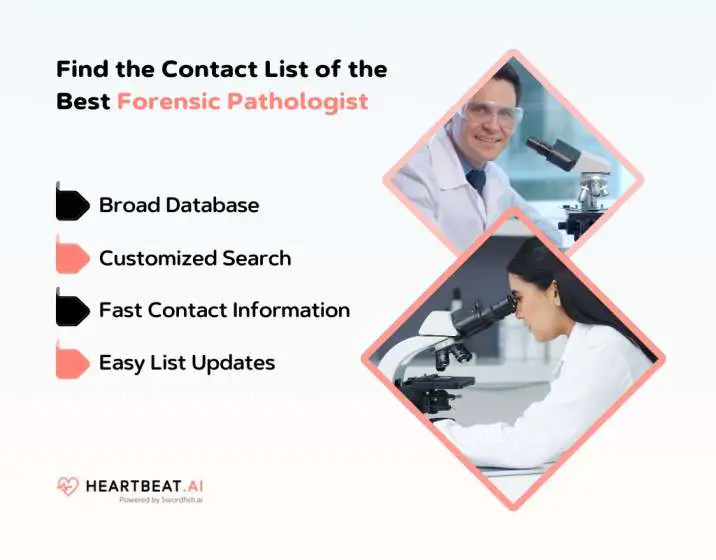
If you need to hire a forensic pathologist, Heartbeat AI simplifies your search with its comprehensive database and smart tools, making the process efficient. Here is how it can help you:
Broad Database
Heartbeat AI has a big database filled with healthcare professionals from all over the country, including many forensic pathologists. This variety makes it easier to find the right match for any specific requirement.
Customized Search
Heartbeat AI’s Prospector tool improves your search by letting you choose specific locations, areas of expertise, and levels of experience. This way, you get a personalized list of forensic pathologists who exactly match what you’re looking for, helping you save time.
Fast Contact Information
Heartbeat AI’s Chrome Extension quickly provides forensic pathologist contacts with a single click as you browse healthcare sites.
Easy List Updates
Heartbeat AI’s file upload feature makes it simple to keep your list of forensic pathologist candidates current. It automatically adds any missing emails and phone numbers when you upload your list, saving you from having to enter this information by hand.
Why Hire a Forensic Pathologist?
Hiring a forensic pathologist is important for several reasons. Here are some key reasons to hire them:
- Solve Crimes: They help solve crimes by examining bodies and finding clues that explain how the person died, which can lead to catching criminals.
- Discover Cause of Death: They can figure out the exact cause of someone’s death, even if it’s not obvious, by looking at the body closely.
- Health and Safety: Their work can identify dangerous diseases or toxins that might threaten public health, helping to prevent more deaths.
- Legal Evidence: They provide important information that can be used in court, helping to prove if a death was accidental, natural, or caused by someone else.
Step-by-Step Guide to Hire Forensic Pathologist
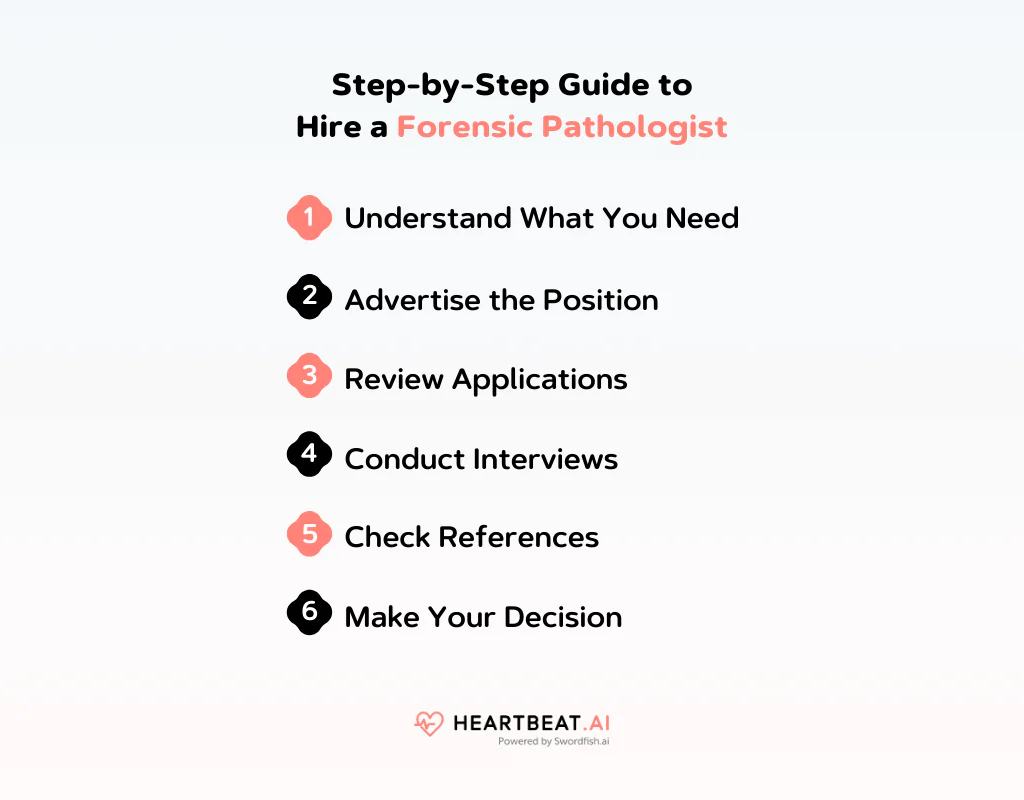
Hiring a forensic pathologist for forensic investigations can be challenging, but it doesn’t have to be. Here’s a step by step forensic pathologist hiring guidelines:
Step 1: Understand What You Need
First off, figure out exactly what you need. This is about understanding the specific tasks you want the forensic pathologist to take on. Do you need someone for autopsies, crime scene analysis, or both? Knowing this helps you target the right candidates.
Step 2: Advertise the Position
Once you know what you’re looking for, it’s time to spread the word. Place ads in medical journals, forensic science associations, and on online job boards that specialize in this field.
Step 3: Review Applications
As applications come in, review them carefully. Look for candidates with the necessary qualifications, such as a medical degree, specialized forensic pathology training, and certification from a reputable board.
Step 4: Conduct Interviews
Next up, interviews. This is your chance to dive deeper. Ask about their experiences, how they tackle tough cases, and their communication and teamwork skills. It’s important to find someone with the right technical abilities who also fits well with your team’s dynamic.
Step 5: Check References
Don’t skip checking references. Speaking to previous employers or colleagues can offer insights into the candidate’s work ethic and professionalism that you can’t get from resumes or interviews alone.
Step 6: Make Your Decision
After all these steps, it’s time to choose. Pick the candidate who not only has the right skills and experience but also shares your organization’s values and seems like a good team fit.
Skills to Look For in a Qualified Forensic Pathologist
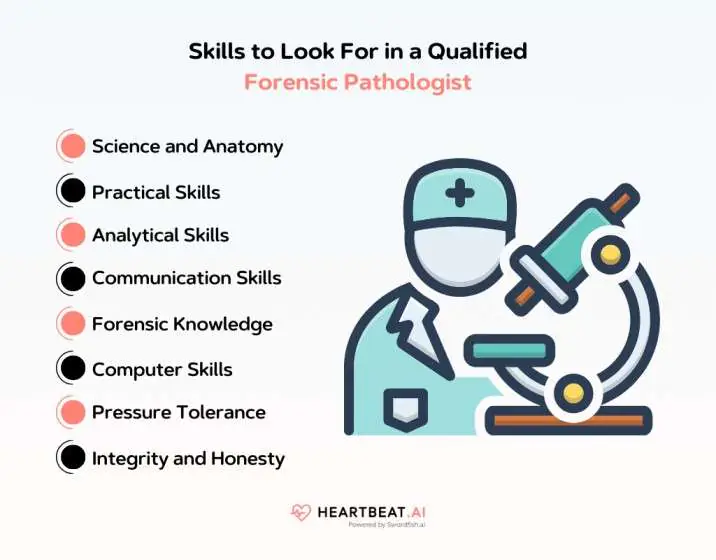
Here are some skills to look for in a qualified forensic pathologist:
- Science and Anatomy: A strong foundation in biology, physics, chemistry, psychology, and anthropology is essential.
- Practical Skills: Being good with your hands is a must. You’ll need to do autopsies, which is like surgery to find out why someone died.
- Analytical Skills: You have to be good at thinking things through, solving problems, and making smart decisions quickly.
- Communication Skills: You need to explain your findings clearly, both in written reports and when speaking, sometimes in court.
- Forensic Knowledge: Expertise in autopsy procedures, evidence collection, and various forensic analyses including toxicology and DNA technology.
- Computer Skills: Being able to use different computer programs is important for your work.
- Pressure Tolerance: Sometimes, you might have to speak in court. It’s important to stay calm and focused, even when it’s stressful.
- Integrity and Honesty: It’s very important to always tell the truth and be fair, making sure you do your job right and without taking sides.
For a comprehensive overview about doctors hiring, check out our doctor hiring guide.
How Much Does it Cost to Hire a Forensic Pathologist?
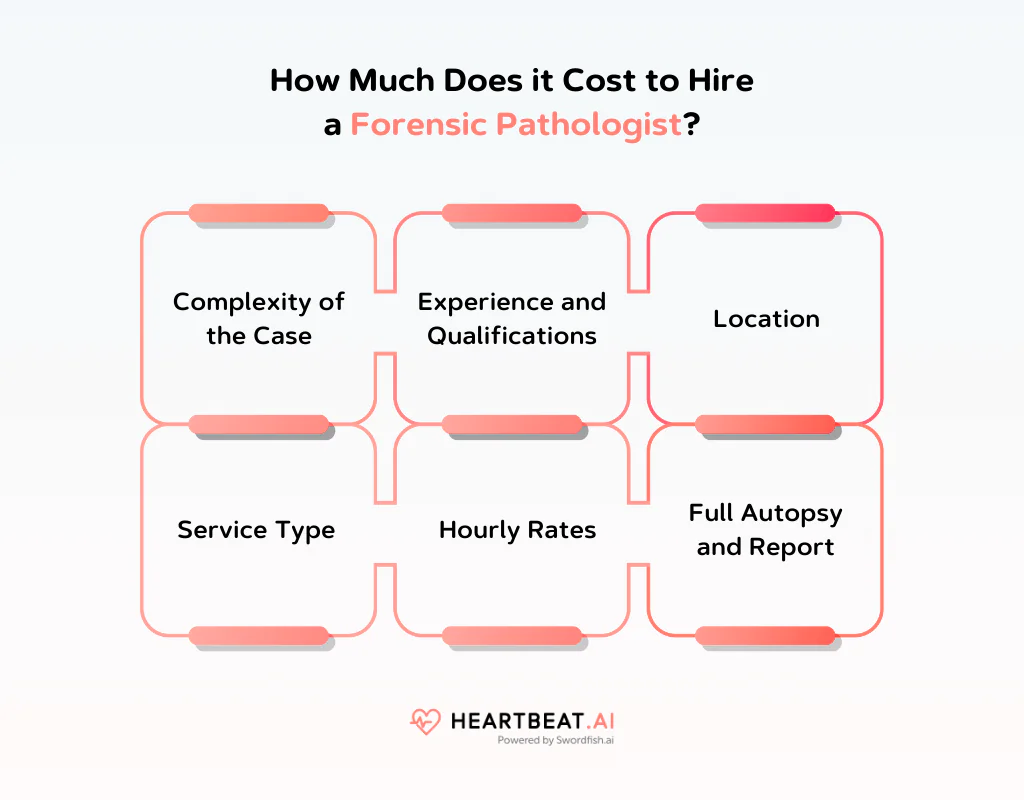
Hiring a forensic pathologist costs can vary based on several factors, including:
- Complexity of the Case: More complex cases may require additional tests and analyses, increasing costs.
- Experience and Qualifications: Highly experienced pathologists may charge more for their services.
- Location: Costs can vary by geographic location.
- Service Type: Charges may differ for one-time consultations vs. ongoing services.
- Hourly Rates: Generally between $200 to $500.
- Full Autopsy and Report: Typically ranges from $3,000 to $5,000, but can vary based on case specifics.
Forensic Pathologist Interview Tips
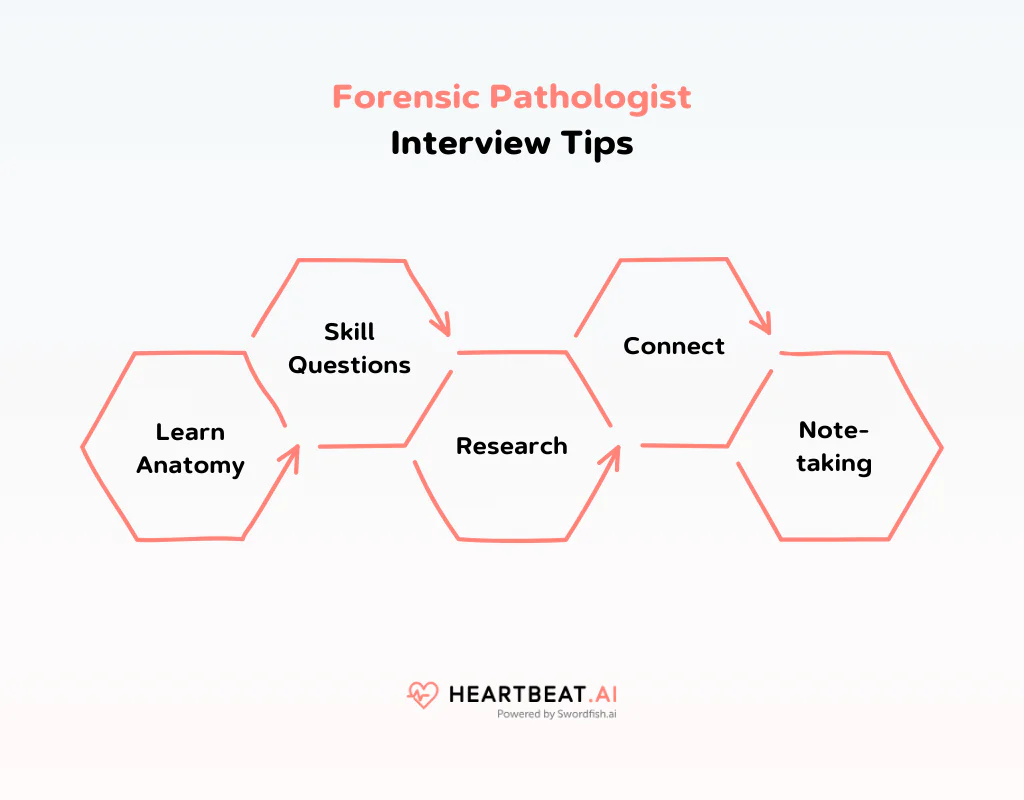
When interviewing a forensic pathologist, it’s crucial to come prepared and make the most out of the conversation. Here’s a brief guide to help you:
- Learn Anatomy: Understand basic human anatomy to ask relevant questions about autopsies and death investigations.
- Skill Questions: Focus on the autopsy process and how they determine the causes of death. Include questions about handling tough cases.
- Research: Know about the pathologist’s workplace, and the job role, and dress appropriately. Bring your resume and any certificates.
- Connect: Treat the interview as a conversation. Use the interviewer’s name and engage in small talk.
- Note-taking: Note down important points during the interview and confirm their accuracy with the interviewee afterwards.
Conclusion
That’s the discussion on how to hire forensic pathologists. To sum it up, hiring a forensic pathologist for your team is really important. It’s not just about their skills, it’s also about getting someone who fits well with what your organization stands for. You want someone who can talk easily with clients, really get where they’re coming from, and feel for them.
It’s also key that they get along well with the rest of your team. Being careful in choosing the right person ensures your clients get the help they need and keeps your team working well together. So, taking your time to pick the right person is definitely worth it.
Frequently Asked Question
What qualifications should a forensic pathologist have?
A forensic pathologist should have a medical degree, specialized training in pathology, and a certification in forensic pathology. Experience in the field and a state license to practice medicine are also required.
How can I ensure the forensic pathologist stays updated with the latest in the field?
Look for candidates committed to continuous education through workshops, conferences, and professional associations. It’s also important to make sure there’s always a chance for training and getting better at the job.
Are forensic pathologists involved in court cases?
Yes, forensic pathologists often testify as expert witnesses in court cases to explain their findings regarding the cause and manner of death. Their testimony can be crucial in both criminal and civil cases.

